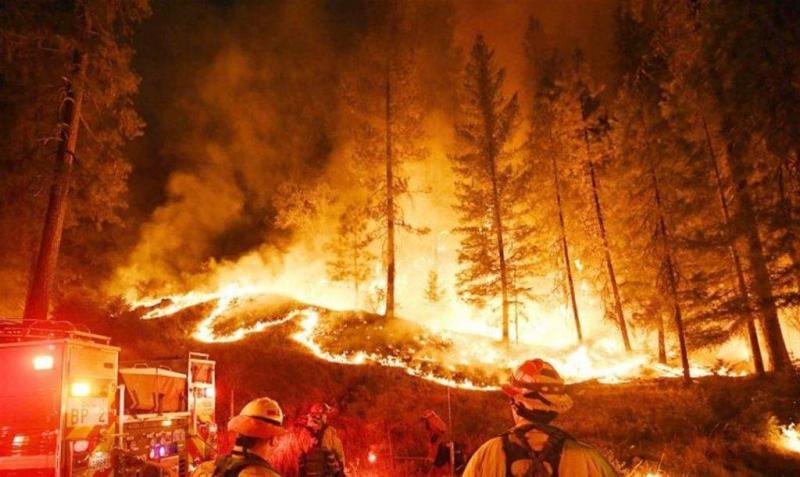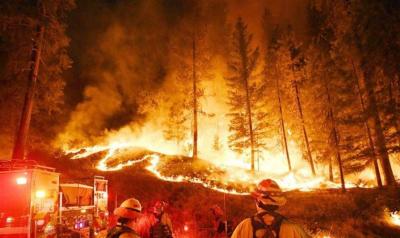The level of danger these days from the outbreak of a series of fires is rising, coinciding with a heat wave across the country. While this threat does not exclude any region, the northern area is taking greater precautions for two main reasons: first, it possesses vast forested areas considered among the largest in Lebanon and the Middle East, and second, its annual share of fires justifies the fear. This reality has prompted authorities to raise alarms to enhance protection and prevention measures, particularly the Ministry of Environment, which announced a different approach this year to mitigate the effects of fires.
Warnings about the increased risk of fires in Lebanon have been issued in recent days, aligned with a strong heat wave that will continue until September 9. Numerous calls have been made by the Ministries of Environment and Agriculture, as well as the meteorological and agricultural research departments, urging relevant parties and the public to take utmost preventive measures to prevent fires or, at the very least, to remain prepared for a possible disaster.
Although the warnings are relevant to all areas in Lebanon, the north is receiving the majority of these alerts. The fear is heightened there due to the potential for fires and the loss of vast forest areas considered among the largest in Lebanon. Perhaps the most concerning today is the fate of two forested areas: the first in the Donnieh region, which includes the Sefira forest, the largest natural pine forest in Lebanon and the Middle East, where a fire erupted from the direction of the town of Batremaz on the 8th of this month. Investigations proved it was an intentional fire. The second area is Akkar, rich in forests, which faced a catastrophic season last year with a series of massive fires in the regions of Qobayat, Jabal Akroum, and Wadi Jannah, devastating an area of 2,580 hectares last year, according to the annual report issued by the Akkar Firefighting Team, which represents an average equivalent to "three years of fires across Lebanon."
The potential for fires and environmental disasters awaiting Lebanon today is not lost on officials, including Nasser Yassine, the Minister of Environment in the caretaker government, who warned in an interview with "Al-Akhbar" about the "risks of fire outbreaks in the coming days due to hot weather and rising temperatures in several areas, such as Akkar and West Bekaa." In terms of confronting potential fires, Yassine stressed the implementation of the national fire prevention plan differently this season, stating, “We focus on areas more prone to fire risks, in collaboration with a group of advisors." According to this plan, “We divided Lebanon into 14 regions previously exposed to fires or more susceptible to fire risks, identifying them in towns and villages with forests and wooded areas exceeding 20 hectares.”
The first step in the response focuses on "constant prevention of fire risks in collaboration with municipalities and organizations, which is why we hold regular meetings with them regarding at-risk areas like Akkar, which is the richest in trees among Lebanese regions. Concurrently, we conduct awareness campaigns aimed at reducing fire risks.” Yassine pointed out that in the event of fires, "we work on multiple levels to confront them," discussing the components of the national plan which covers five areas: first, prevention and risk reduction; second, monitoring and early warning through daily bulletins and patrols; third, through first responders who intervene quickly to combat fires manually and with simple devices such as shovels and small vehicles (ATVs) like those used by the Akkar Firefighting Team and similar organizations in West Bekaa, Tyre, Aley, Shouf, and Jezzine; fourth, through rapid intervention by civil defense teams which we try to support as much as we can with maintenance and fuel; and fifth, through the intervention of the Lebanese Army helicopters to extinguish fires in hard-to-reach areas.
**The Threat of Intentional Fires and Insufficient Response Resources**
On the ground, the situation in Donnieh and Akkar does not differ from what Yassine described, as the risk of fire outbreaks is very high these days, according to volunteers in the civil defense in both regions, who preferred not to be named. This risk may reach "up to 85% these days and does not fall below 80%." While the high heat waves are the main reason for the increased threat level, they cite other reasons that could lead to fire outbreaks this season, including deliberate ignitions near or within the forests. They confirm that "many firewood and charcoal traders ignite fires in nearby dumps or within forests, or burn dry grass in fields and orchards that quickly spreads to the forests, or set intentional fires to seize state lands for cultivation."
The volunteers highlight the danger of these actions, especially when a fire breaks out in large forests, where "extinguishing them becomes difficult, particularly in areas without access roads for machinery, such as the Sefira pine forest, where a fire erupted earlier this month and could only be extinguished with the help of the Lebanese Army helicopters." Compounding these difficulties is the crisis in resources, where sufficient equipment is lacking, due to many volunteers being unable to attend civil defense centers because of the high costs of travel resulting from rising fuel prices, and the malfunctioning of some units that can only be repaired with the help of donors and expatriates.
Conversely, the conditions of the forest rangers in the Donnieh and Akkar centers are no less difficult than those of the civil defense volunteers. These rangers called on residents and municipalities to "be preventive, vigilant, and oversee, whether before or after fires erupt," especially as "we suffer from inadequate resources, which impacts our ability to conduct necessary patrols, even though we need to conduct these patrols around the clock these days." Furthermore, the forest rangers noted that "the environmental situation is very bad; the fires, for example, and illegal logging have not ceased in the Wadi Jannah area for nearly over a year, and currently, the logging is progressing at a high rate due to citizens stocking firewood for winter instead of diesel fuel due to its soaring price." They held "municipalities and municipal unions partially responsible in this context, indicating that if municipal police carried out regular patrols, the fire incidents would have significantly decreased."




